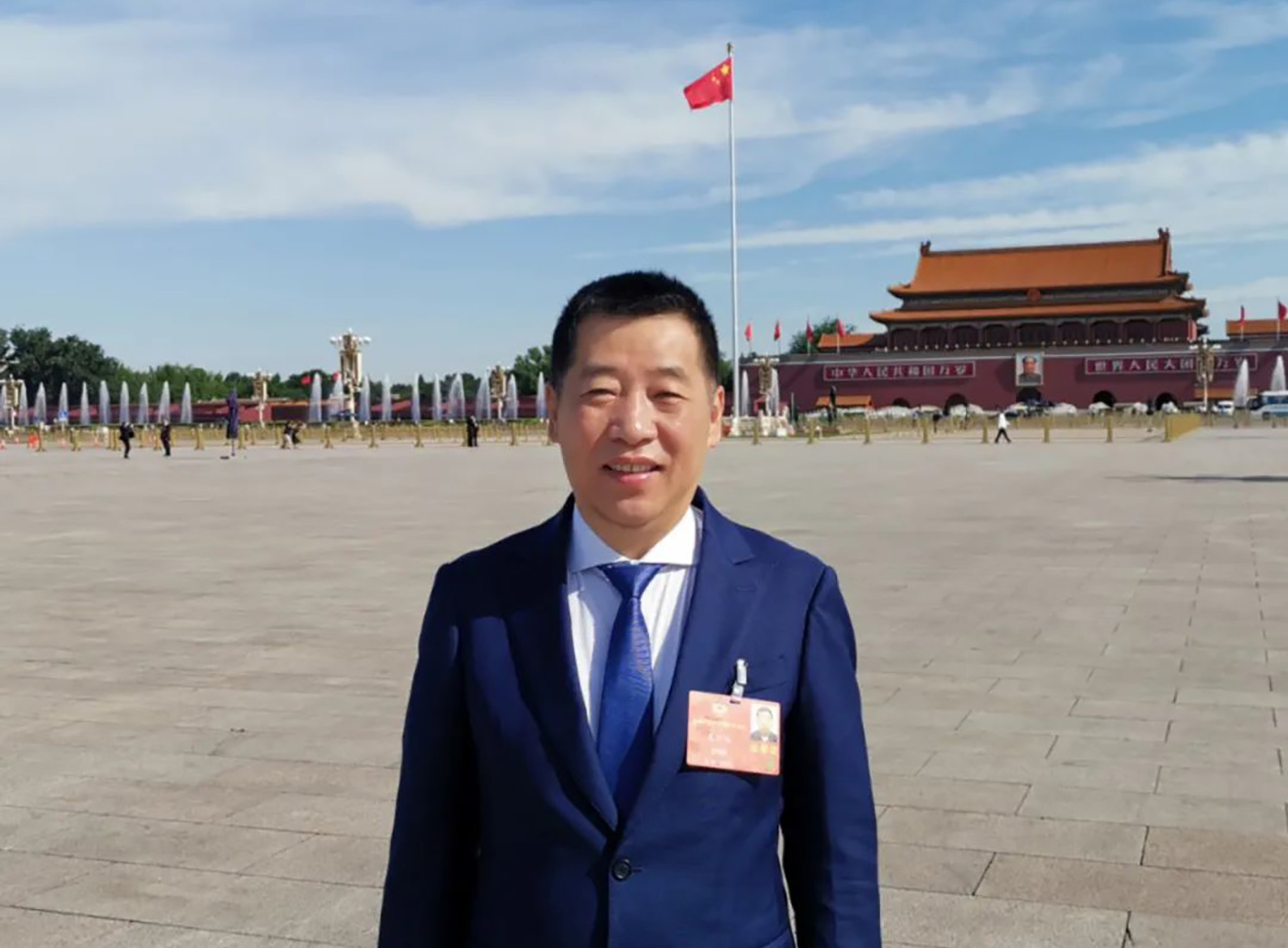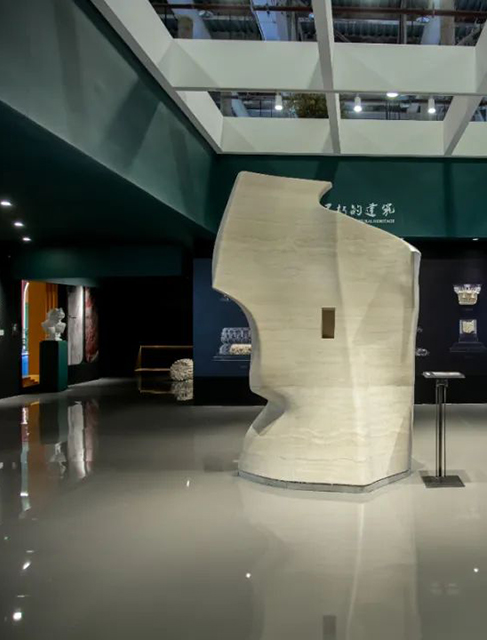Marble Chu Committee member was interviewed: The stone industry should form a pattern of green mining and orderly competition

Recently, Marble Chu, a member of the National Committee of the Chinese People’s Political Consultative Conference attending the Two Sessions in Beijing and the chairman of UMGG, was interviewed by a reporter from China Building Materials News. Facing the questions from the reporter of “China Building Materials News”, Mr. Marble Chu was patient and enthusiastic.
Reporter: What proposals have you brought this year? Why were these aspects chosen?
Marble:This year’s proposal is about “improving the business environment, the government should have a spirit of contract”. We have been engaged in the real economy for 34 years and have made investments in many provinces and cities on the Chinese mainland. We have a deep understanding of the importance of the business environment. The spirit of contract emerged in the process of the development of the commodity economy and is the spirit of keeping one’s word on the basis of freedom and equality among all parties. The key for the government to gain the trust of the people and an important guarantee for improving the business environment is to administer according to law, keep its word and abide by contracts. However, in recent years, the frequency and intensity of policy adjustments have been relatively high, which has become one of the external factors that enterprises pay the most attention to. Behaviors that obviously violate the spirit of contract and the principle of the rule of law occur from time to time in various places.
Typical phenomena include failure to honor promises and fulfill agreements. Many local governments, when attracting investment or signing agreements with enterprises, make hasty promises. The terms lack operability and sustainability. Later, they often use policy changes, superior supervision, or the spirit of documents as excuses to fail to keep their promises or fulfill the agreements, and even suddenly shut down the enterprises.
“New officials ignore old debts.” When formulating policies, some local governments attach too much importance to short-term interests and give insufficient consideration to medium – and long-term interests. For instance, regarding policies such as taxation and land, the current government has overdrawn the governance space of the next administration for several years to come, resulting in great difficulties for anyone taking over and the inability to implement the policies. Coupled with the influence of an incorrect view of political achievements, some new cadres are “devoted to their superiors and disregard their subordinates”, being keen on developing new projects and striving to achieve visible political accomplishments to their superiors as soon as possible. This might break the old pattern of the predecessor and achieve some breakthroughs in work. However, it is also likely to lead to a lack of continuity in planning and policies. For the “old debts” of the former party, including signed agreements, promises to investors, and payable project funds, they would shirk or delay as much as possible, and even openly default on their debts.
The new policy is retroactive. The law has the fundamental principle of “non-retroactive effect”, which is applicable worldwide. The new rules only handle the subsequent matters, while the previous ones still have to be handled according to the old rules. But in reality, many new policies introduced by local governments are retroactive. Enterprises that originally had complete licenses and certificates have become non-compliant and can no longer operate when new policies are introduced.
Sports-style law enforcement. Local government departments often adopt campaign-style law enforcement measures such as concentrated rectification and special rectification when implementing the policies and guidelines of their superiors or dealing with prominent problems that have emerged in individual enterprises. During the process, there were indiscriminate practices such as “shutting down all” and “shutting down first and then discussing”, which were all “one-size-fits-all” approaches. This is a manifestation of lazy governance and runs counter to the principles of the rule of law and the spirit of contract.
Reporter: Do you have any specific suggestions for improving these typical phenomena?
Marble:It is believed that first, we should implement law-based administration and promote the construction of a law-based government. The rule of law is the best business environment. The rule of law is a fundamental task in economic development. It is the only way to deepen reform, expand opening up, further invigorate the market and inspire the entrepreneurial spirit. It is suggested that from the central to local governments, law-based administration should be regarded as a key task, and the spirit of relevant documents such as the “Opinions on Improving the Property Rights Protection System and Protecting Property Rights According to Law” should be thoroughly implemented. From top to bottom, the awareness of keeping promises, protecting property rights and law-based administration at all levels of government should be firmly established.
Second, do a good job in the handover upon leaving office and reform the performance evaluation system. Improve and implement the departure handover audit system and the responsibility system for major decisions. Use the system to force local governments to make scientific and prudent decisions, reduce major mistakes and short-sighted behaviors, and avoid leaving a “mess” for the next generation. Reform the evaluation system for cadres’ performance and incorporate the clearance of “old debts” into the assessment. At the same time, introduce a negative list system for implementing policies and fulfilling commitments. In combination with the problems reflected by enterprises, ensure that behaviors that violate the negative list affect the assessment results.
Third, standardize the trial of administrative litigation and enhance the publicity of typical cases. Taking the “Judicial Interpretation on Administrative Agreements” just released by the Supreme People’s Court as an opportunity, we should deeply publicize and standardize the implementation of the revised “Administrative Litigation Law” throughout the national judicial system, conduct fair administrative litigation trials, and protect the legitimate rights and interests of all types of market entities. Widely publicize the “Typical Cases of Protecting Property Rights and the Legitimate Rights and Interests of Entrepreneurs” released by the Supreme People’s Court, and form a broad consensus among the administrative, judicial systems and the public.
Fourth, establish a long-term mechanism for collecting, sorting out, supervising and feeding back enterprise problems to ensure that enterprises have smooth channels to reflect the true situation, opinions or suggestions.
Reporter: As the spokesperson for the stone industry at the National Two Sessions, how do you view the current situation of the industry?
Marble:First of all, I fully agree with the national policy on mine environmental improvement. Because the random mining and vicious competition in the past have caused serious damage to the mining environment and a huge waste of stone resources. However, I don’t quite agree with the “one-size-fits-all” approach adopted in some places.
Stone production is a physical process of mechanical cutting and grinding, which is different from other traditional building materials. It does not have kilns, does not add chemical materials, does not produce harmful gases or waste, and usually adopts wet operation, which can effectively reduce dust. The production water and the waste residue generated during the cutting and grinding process can also be reused. The negative impression of the stone industry mainly stems from the past disorderly mining and unregulated development.
Therefore, I fully support the environmental protection rectification measures taken by the government departments. Mining resources are extremely precious. It is hoped that policies will support and guide the industry to integrate and upgrade, develop in a standardized manner, and eventually form an environment of green mining and orderly competition.
Reporter: After listening to the government work report, what expectations do you have for future development?
Marble:Facing the complex domestic and international economic situation, the government work report emphasizes that measures such as proactive fiscal policies should be taken to ensure the “six guarantees” and “six stabilities”, deepen reforms to stimulate market vitality, expand domestic demand and achieve higher-level opening up, and adopt multiple measures to respond to changes and challenges. It is scientific, pragmatic, stable and flexible. Such information is like a “reassuring pill” for enterprises. Facing future development, We are more confident.
Reprinted from: China Building Materials News Network
Reporter from China Building Materials News: Wu Yue
Editor: Yin Yin Wang Weina
Proofreading: He Xinlong
Supervisor: Wang Yijie






